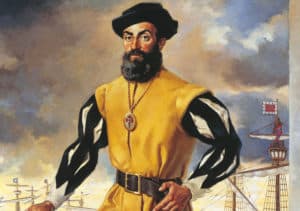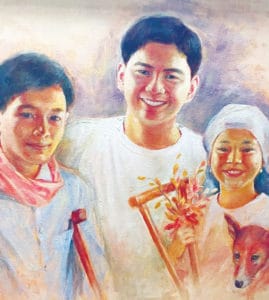Yearly in August, we celebrate “Buwan ng Wika” (National Language Month) and National Heroes Day. In this connection, we put a spotlight on President Manuel L. Quezon who promulgated and instituted a national language which later evolved to include all the native languages in the Philippines.
Coincidentally, the anniversaries of his birth and death both fall in August. Just a few months ago, a little-known fact about Quezon was brought to light in the film Quezon’s Game. Though documentaries have been made about Quezon’s life, it still came as a surprise for many Filipinos to discover his magnanimous efforts to save the lives of thousands of persecuted Jews.
Quezon’s Game is a big eye-opener for many Filipinos for it showed the best in a Filipino leader: being in solidarity with suffering humanity. In spite of his limits, Quezon’s act was worth remembering as we commemorate his 75th death anniversary.
As we look back in time, we might also say what Quezon said in the film: “I could have done more.” But we know that what deterred him were the limits imposed by time and politics. He even died while in exile in America, missing the chance to see his nation gain independence from the United States, but his gesture of opening the doors of the Philippines to foreign refugees will be forever remembered as a courageous act in Philippine and world history.
500th year of Magellan’s expedition
Another historical commemoration this month is the 500th anniversary of the start of Ferdinand Magellan’s expedition that circumnavigated the world. It started in Seville, Spain on August 10, 1519. This launch to find the first western route to the “Spice Islands” (now the Moluccas in Indonesia) led him and his crew to discover the Philippine Islands in 1521.

Linked to this however, is another noteworthy event which took place that very same year: the arrival of Christianity in our land. We cannot dispute the fact that what Magellan and his crew did was a breakthrough in the history of navigation. This human feat is worth celebrating.
What Magellan and his men accomplished was something that changed the course of history, especially for these islands which were later called “Filipinas.” To debate whether we could have been better off without the Western influence of Spain or the US would be pointless as history unfolds in its own way. Since the Spanish monarchs had the resources and the science at their disposal, it was inevitable for Spain, being one of the powerful empires of that time, to explore and conquer new territories.
Philippines: Past and Present
At one time in history, the Philippines was one of the wealthiest nations in Asia after World War II with good infrastructure, and peace and order in place. Even the mainland Chinese and the Vietnamese sought refuge here after the Communist takeover in their countries.
The Philippines was a land of promise and opportunity. However, decades after independence, the Philippines fell into a grave political and economic crisis that made other nations tag it as the “sick man of Asia,” especially in the 1970s and 1980s. The country
is rich in gold and other minerals, and even oil in its unexplored seas. For this reason, many foreign nations have their eyes on its resources.
But more than that, Filipinos have shown resiliency and steadfastness in the face of various natural disasters, as well as economic and political crises. These qualities are also exemplified by our Overseas Filipino Workers (OFWs) and those who have migrated to other countries.
Filipinos can easily land jobs overseas as domestic helpers, caregivers, nurses, construction and IT workers. The Philippines is the major supplier of seafarers and now, even teachers. It ranks second in the Business Process Outsourcing (BPO) sector.
Filipino Saints and Heroes
Over the past centuries, several Filipino Catholics have been considered for sainthood. Among them are Lorenzo Ruiz and Pedro Calungsod, two lay martyrs who were declared saints. Recently, the Vatican has recognized the heroic virtues of Bishop Alfredo Maria Obviar, and two Filipina nuns, Francisca del Espiritu Santo de Fuentes and Maria Beatriz del Rosario de Arroyo, and thus are now declared “Venerable,” one step closer
to beatification.

All these Venerables excelled in charity and love of country. Moreover, there is a long list of “Servants of God” like Bishops Teofilo Camomot and Alfredo Versoza, the Jesuit scholastic Richie Fernando, and most recently, the youthful Darwin Ramos. Christianity’s contribution to Philippine history cannot be downplayed, notwithstanding the fact that Spanish colonization subjugated the natives of our land.
Just think of Fathers Gomez, Burgos and Zamora (GOMBURZA), the three priests whose martyrdom made a huge impact on many Filipinos, including our national hero, Jose Rizal. It was also the early Spanish friars who developed our educational system, and some of them even studied the local languages, preserving the rich culture of different ethnic groups. (Thanks to them, the varied culture of Filipinos was not totally wiped out like what happened to some mission areas in Latin America).
National Artist and renowned novelist Nick Joaquin, in his book Culture and History, affirms that the Spaniards were the ones who introduced to Filipinos what was modern technology at that time, a factor which put our emerging nation on the world map.
The Christians’ game in Asia
When St. John Paul II first visited the Philippines in 1981, he said that it was not accidental that Magellan and his ships landed on our shores. He saw the plan of God in that event. He thus exhorted the Philippine Church to be in the forefront of missionary activity in Asia.

This is also in line with what Vatican II emphasized about the Church’s mission “ad gentes,” that is, to proclaim the Gospel of Christ to the nations of the world. But with more and more Asian theologians on the rise, the consensus is that, more than “ad gentes,” the Church is called to mission “inter gentes” (among the nations) as evangelization in Asia must be lived and carried out in the context of other major religions, some of which antedate Christianity.
Just as “Quezon’s game” was an act of solidarity, the Christians’ game in Asia should be one of “making themselves one with others,” welcoming people of other faiths and engaging in dialogue to respect religious plurality in Asia. The gift of the Christian religion in the Philippines should be a reason for journeying together with other religions, not imposing a culture over others but respectfully announcing it as a gift to others.
We should work towards fostering harmonious relationships, especially today, as many nations are becoming aware of the ever-greater need for intercultural and interreligious dialogue to achieve peaceful co-existence.




